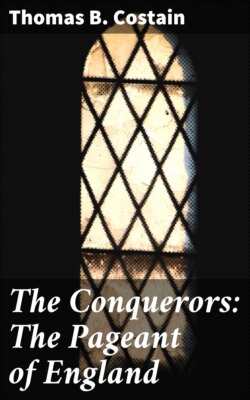Читать книгу The Conquerors: The Pageant of England - Thomas B. Costain - Страница 9
На сайте Литреса книга снята с продажи.
4
ОглавлениеTable of Contents
William’s army was camped around Hastings, facing a spur of the Downs which provided a formidable horizon northward. The rising ground ahead of them was in reality a clutter of choppy hills, through which ran deep ravines with bottoms of broken stone and trickling streams called in those days becks. Strategically placed in the midst of this tumbled confusion of levels was the ridge of Senlac, with high hills from behind which a glimpse might be had of the sea, its flanks well guarded by nature. This ridge was large enough to contain an army; and here on October 14 was fought one of the most discussed and most written about, certainly the most wept over, and most deeply deplored battle in English history.
Harold, not waiting for the tardy earls from the north to arrive with their forces (and not sure even that they would come) because the savage wasting of the countryside was forcing his hand, showed his skill as a general by disposing his hastily assembled and ill-equipped army along Senlac. It was perfect for his purpose. Here he commanded all the roads. Here he could watch the Normans like the eagle from its lofty perch, and pounce if there was any attempt at diversion of forces. Here he had a strong defensive position which he proceeded to improve with trenches and barricades of stakes and osier hurdles. Here he waited.
William had two alternatives, to fight a pitched battle on Harold’s terms or take to his ships. He chose, of course, the former. On the morning of the battle he exhorted his troops at great length, making clear to them that victory meant glory and wealth, but defeat was death for every Norman on English soil. Then the charge began, a fearsome spectacle of steel-clad men on madly plunging chargers, standards swaying wildly above the ranks, covering the rolling ground like a rising tide. A minstrel named Taillefer was in front, tossing his battle-ax in the air and singing the Song of Roland. The defenders on the ridge ahead responded with the deep-throated Saxon invocation to the Rood. A few raised for the first time the cry which was to be employed in clashes so often later, that pathetic shout of men in chains, “No Normans! No Normans! No Normans!”
Between the English center and right a spur ran out and down from the ridge. The chief Norman attack was along this spur, wheeling at the top to attack the English center; certainly not a favorable situation for the assailants. The interlocked shields of the English were a greater obstacle, however, than anything nature had provided. The Normans were thrown back time and again. Taillefer was killed, William was unhorsed, the hopes of the invading forces reached a low ebb. Then William set his mind to finding other methods than the shock of frontal assault. Twice he had his men simulate retreat, drawing the inexperienced Saxons after them in undisciplined and exuberant pursuit, then turning and cutting the ill-armed peasants to pieces. Even in the face of these losses and the consequent weakening of his flanks, Harold still stood firmly in the center, his brothers Gyrth and Loefwin beside him, the Standard of the Fighting Man as defiantly erect as ever.
The shield wall of the center held as though the men behind it knew that a break would mean not only their deaths and the subjugation of England but also the extinction for centuries of a light which they, the Anglo-Saxons, had kindled, the light which was to guide men in their long quest for freedom. How bravely they stood!
If the archers of Crécy and Agincourt had stood on Senlac with their mighty longbows, the Normans would have been cut to pieces as they charged up the slope. But the English had not yet any great addiction to the bow. They relied on the battle-ax, which was a doughty weapon at close range and one they understood. The Normans had more archers than Harold, and it was a wily use of the weapon which William employed as his final effort to break that stubborn wall.
“Shoot your arrows into the air!” he ordered.
His hired crossbowmen dropped back far enough to enjoy ease of aim. The arrows began to rain into the circle of English resistance. This lethal hail was so thick that the losses seemed unbearable; unbearable indeed, for one lodged in the eye of the brave Harold. He fell to the ground and writhed in the most intense agony before death came. The heart went out of the defense as soon as this terrible news spread through the ranks.
The wall broke and the battle became a confused tangle of personal fighting. The sun went down and with it the hopes of men for individual freedom.
